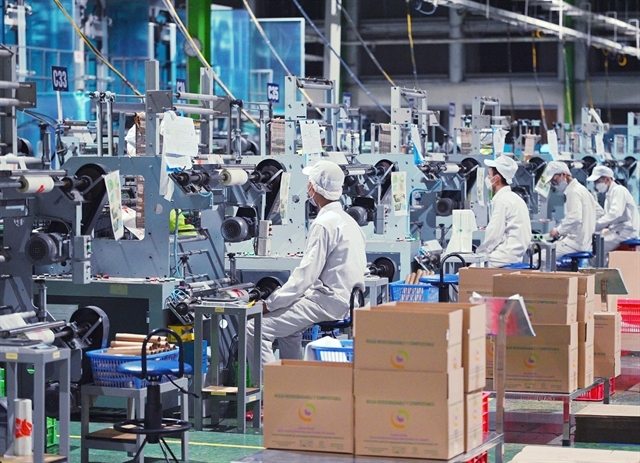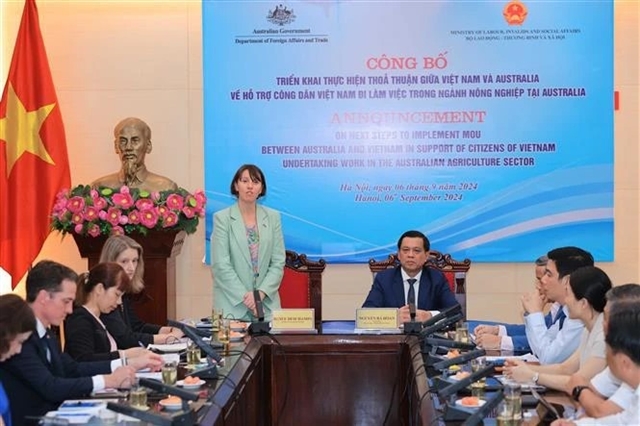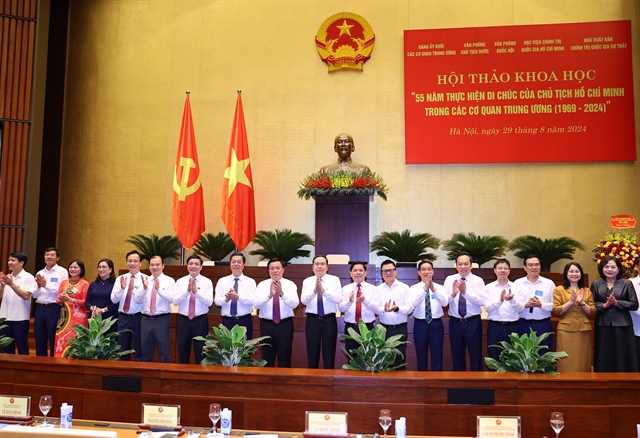▌Câu trả lời hay nhất
Thenhững cầu thủ bóng rổ hay nhất thế giới Vietnam News Agency introduces the translation of the article: Digital transformation – important motivation for developing productive forces, perfecting production relations, taking the country into a new era.
 |
| The production line of completely biodegradable biological products at factory No. 6 of An Phát Bioplastic Company in Nam Sách District in the northern province of Hải Dương.—VNA/VNS Photo Tuấn Anh |
HÀ NỘI — Party General Secretary and President Tô Lâm has written an article highlighting the role of digital transformation in national development.
The Vietnam News Agencyintroduces the translation of the article: Digital transformation – important motivation for developing productive forces, perfecting production relations, taking the country into a new era.
1. Right after seizing power, our Party was deeply aware of the importance of developing productive forces and step by step reforming and perfecting production relations. The process has taken place through many phases, reflecting the unceasingly movement and development of the Vietnamese Revolution.
The August Revolution of 1945 turned a new page in the national development history in the context that the country had just gained independence and entered in a long-term resistance war. From the starting point of a backward agriculture after thousands of years under feudal rule and hundreds of years under the colonial yoke, our Party implemented the policy of “land for the tiller”, aiming to give land to farmers, abolish the private ownership of the means of production and work towards reforming production relations, creating the prerequisite for building the socialist mode of production.
In the period from 1954-75, the Vietnamese revolution carried out two strategic missions at the same time, which was the socialist revolution in the north and the people's democratic revolution in the south. In the north, the core task was to build material-technical foundation for socialism, while strengthening and perfecting new relationships of production based on three pillars of public ownership, centralised planning management and labour-based distribution, resulting in leaping development of productive forces.
In 1975, the country was fully re-unified, opening up a new chapter in the building of socialism. The fourth National Party Congress in 1976, based on the assessment of the country’s major characteristic which was to advance directly from small-scale production to socialism, bypassing the stage of capitalism, set the direction of steadfastly adhering to dictatorship of the proletariat, promoting the right to collective ownership of working people, and resolving to simultaneously conducting three revolutions in production relations, science-technology and ideology-culture. Among them, the revolution in science-technology was the key and industrialisation was the central task.
From 1979 to before the sixth National Party Congress in 1986, Việt Nam went through serious crises, partly due to the non-uniformity between productive forces and production relations. The productive forces were restrained not only in the case of backward production relations but also when some elements of production relations greatly surpassed the development level of productive forces. Aware of this issue, the sixth National Party Congress decided to conduct comprehensive renewal, taking economic reform as the core, accordingly transforming economic structure, developing diverse economic sectors, reforming management mechanisms, abolishing subsidisation, and step by step transitioning to a socialist-oriented market economy.
Resolution 10-NQ/TW dated April 5, 1988 of the Politburo was a breakthrough step in reforming production relations in agriculture when officially recognising the household as an independent economic unit and handing over long-term land use right to farmers, which suited the requirements in the development of productive forces. After only one year implementing the resolution, Việt Nam, after a long time of food shortage, produced 21.5 million tonnes of unhusked rice and exported 1.2 million tonnes of rice for the first time. The appropriate adjustment of production relations created a new motivation for the development of productive forces, taking the country out of crisis and into a period of all-round renewal and international integration.
2. Entering the 21st century, Việt Nam has gained significant achievements in socio-economic development. The average GDP growth rate for the 2021-25 period is estimated at 5.7-5.9 per cent per year, among the highest groups in the region and the world; and the scale of the economy is expected to increase by 1.45 times to top US$500 billion by 2025. Per capita income will rise substantially from $3,400 USD to approximately $4,650, positioning Việt Nam in the upper-middle-income group in 2025. The macroeconomic environment is stable, inflation is controlled, and policies are implemented flexibly and effectively. Việt Nam's international standing and reputation are continually rising, with high economic growth rates and significantly improved living standards.
By 2025, the workforce is expected to reach 53.2 million people, with a positive shift in structure. The proportion of labourers in agriculture will decrease significantly to 25.8 per cent, and the quality of human resources will continually improve with 70 per cent of the workforce receiving training. The focus will be on developing high-quality human resources that can meet the demands of the Fourth Industrial Revolution in key areas such as semiconductor, artificial intelligence (AI), and information technology, gradually forming a contingent of workers with increasingly enhanced digital thinking and skills.
AI, Internet of Things (IoT), big data and cloud computing are gradually becoming essential production tools across various industries and sectors. Infrastructure, particularly digital infrastructure, is being strongly developed. The telecommunications and broadband internet networks now cover the entire country, providing a foundation for the development of the digital economy and digital society.
However, we also face new challenges. The globalisation and international integration process poses an urgent requirement on enhancing the competitiveness of the economy. The Fourth Industrial Revolution is advancing rapidly, and the development of production tools in the digital economy is creating profound changes in productive forces, leading to new conflicts with existing production relations. This not only creates the prerequisite and motivation for the formation of new modes of production in the future, but also requires fundamental changes in the organisation of production and social management. While new productive forces are forming and developing rapidly, there remains a gap between the quality of human resources and the requirements of the country’s development in this new phase. Training of human resources, particularly those working in the high-tech sector, remains a significant challenge. Production relations still contain many inadequacies, failing to catch up with the development of productive forces.
At the same time, mechanisms, policies, and laws are not yet fully synchronised, remain overlapping, thus failing to create a truly favourable environment to attract resources from both domestic and foreign investors, as well as from the people. The implementation of laws and policies remains a weak link.
The organisation and completion of a streamlined and effective state administrative apparatus with less intermediary levels still show shortcomings, with some parts remain cumbersome and legislative and executive functions overlapping, failing to meet the requirements for improving management effectiveness and efficiency. Some ministries and sectors still take on tasks that should be the responsibility of local authorities, leading to the mechanism of request and favour, which can easily leading to negative phenomena like corruption. Efforts to streamline personnel associated with job positions and improvement of the quality and restructuring of the civil service remain inadequate.
Limitations remain in administrative reform, digital transformation, and the development of e-government and digital government. There are still cumbersome and outdated administrative procedures that involve many steps and offices, consume considerable time and effort from citizens and businesses, and easily create opportunities for petty corruption and hinder development. Data connectivity and sharing among information systems of ministries, sectors, localities, and national databases are not seamless. Many online public services are of low quality, and the usage rate remains low. Additionally, the "one-stop shop" units at various levels are not yet effective in many places.
Based on the theoretical foundation of Marxism-Leninism, we recognise that in the relationship between productive forces and production relations, productive forces play the decisive role in the development of production relations, and production relations must continuously be adjusted to match the ever-increasing level of productive forces. When production relations do not keep up with the development of productive forces, they become an obstacle, hindering the progressive development of the entire mode of production, thus affecting the overall development of the country.
3. We are facing the requirement for a revolution with strong and comprehensive reforms to adjust production relations, and create new motives for development. It is the digital transformation revolution with the application of science technology so as to restructure production relations, making them align with the outstanding progress of productive forces. Digital transformation is not merely the application of digital technology in socio-economic activities, but also the process of establishing a new, advanced and modern mode of production – the "digital production mode", in which the prominent characteristic of productive forces is the harmonious combination between humans and artificial intelligence, with data becoming a resource and an important means of production, and production relations also undergoing profound changes, particularly in the form of ownership, and distribution of digital means of production.
Changes in production relations will create major impacts on the superstructure, open up a new mode of social governance, creating new tools in state management, and fundamentally changing the way of interaction between the State and citizens, and between social classes. The process of digital transformation must be carried out in a comprehensive and harmonious manner, taking into account the dialectical relationship between infrastructure and superstructure, so as to build a socialist-oriented market economy, promote the strength of modern productive forces, and ensure the good nature of the socialist regime, in accordance with the specific conditions of Việt Nam in the new era. To realise the targets, heads of Party committees, administrations, agencies and enterprises, as well as the people must gain full awareness of, take responsibility for, and resolve to carry out the process, while focusing on the following key tasks:
First, completing mechanisms and legal system, steadfastly pursuing the goal of a socialist-oriented market economy, and unceasingly renewing to keep up with the development trend of the era. Focusing on building legal corridors for the digital economy, creating a foundation for Việt Nam to grasp opportunities from the fourth industrial revolution. Putting in place strong mechanisms and policies to promote digital transformation in all socio-economic sectors, encouraging innovation, and protecting intellectual property rights. Regularly reviewing, timely amending outdated regulations, creating corridors for new economic models such as sharing economy, circular economy, and artificial intelligence, ensuring that legal frameworks will not become barriers to development, while still ensuring national security, and protecting legitimate rights and interests of the people and businesses.
Second, unleashing and maximising all resources in society, and accelerating modernisation. Creating suitable mechanisms and policies to mobilise the enormous resources from the people, businesses and economic sectors, resources from land and assets accumulated by the people, and turning the potential into motivation and means of production to create material wealth for society. Creating an open and transparent investment climate to draw both domestic and foreign investment for science technology development and innovation. Maximising the human resources – the decisive factor for the renewal process. Creating breakthrough mechanisms to attract domestic and foreign talents, and building a strategy to develop human resources with adequate knowledge, skills, and innovative and creative minds, meeting the requirements of the digital economy, and the fourth industrial revolution.
Third, reforming and building a streamlined and effective state apparatus. Slashing unnecessary intermediaries, arranging the organisation towards multi-sectors and multi-fields. Accelerating decentralisation and delegation of power in tandem with enhancing inspection and supervision, and clarifying the responsibilities of central and localities, administrations at local levels, and managers and workers. Perfecting inspection and supervision mechanisms, ensuring consistency in state management and promoting the proactiveness and creativity of localities. Promoting the application of information technology, building a digital platform to connect and share data among agencies and organisations. The goal is to rank in the top 50 leading countries in the world and the third in ASEAN in terms of e-government and digital economy in 2030. During the reform process, adhering to the principle of the Party leadership, State management, and people’s ownership. The streamlining of the apparatus must improve the efficacy of state management, the quality of service for people and businesses, and create a favourable environment for socio-economic development.
Fourth, promoting digital transformation in association with ensuring security and safety is an objective necessity for Việt Nam to create breakthroughs in the new era. Focusing on building a digital society, comprehensively digitalising state management activities, and providing high-level online public services. Harmoniously connecting national databases on population, land, and businesses, creating a basis to streamline the apparatus and substantively reform administrative procedures. Developing the digital economy to create new momentum for growth, and promoting the application of digital technology in all industries and fields to create new business models. Developing digital citizens, equipping citizens with necessary knowledge and skills to effectively participate in the digital economy and digital society, ensuring that no one is left behind.
Our country is facing both opportunities and challenges on the development path. Under the leadership of the Party, and with the consensus and joint efforts of the entire Party, people and political system, we will certainly successfully carry out the digital transformation revolution, and create breakthroughs in the development of productive forces, and perfection of production relations, helping out nation and people rise up in the new era of advancement, civilisation, and modernity.— VNS












